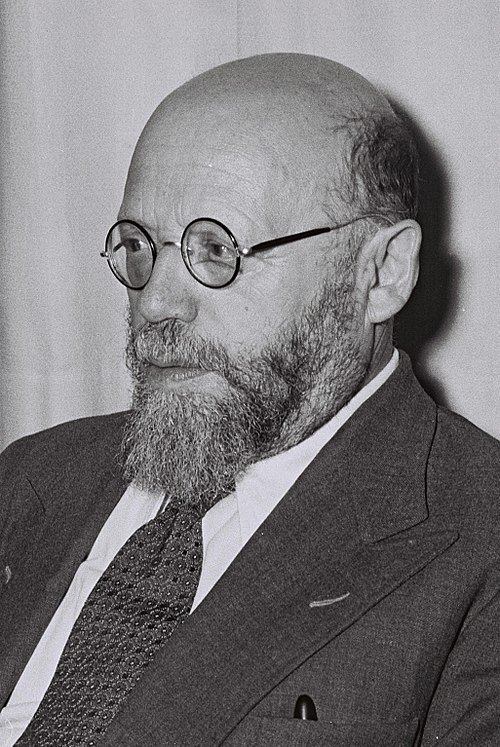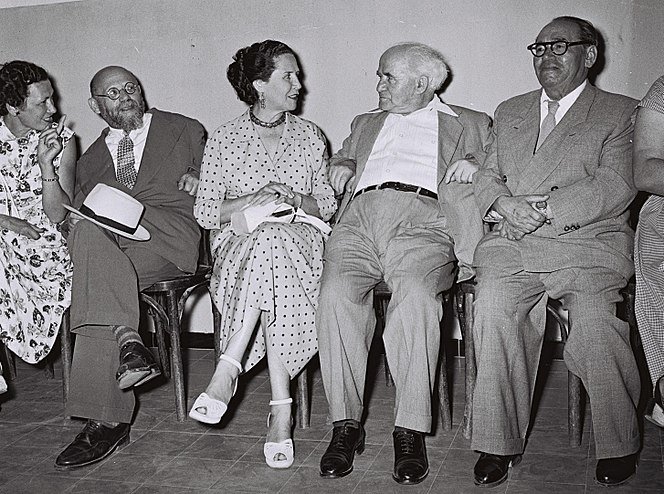מורשת גדולי האומה
בזכותם קיים
beta
Benzion Dinur: The Historian of the Jewish People
Benzion Dinur (also known as Dinburg) was born on January 2, 1884, in the town of Horol, part of the Poltava Province in the Russian Empire, in what is now Ukraine. He was a prominent historian of the Jewish people, an educator, and a professor of Jewish history at the Hebrew University in Jerusalem. Dinur was a member of the First Knesset representing Mapai, the Minister of Education in Israel, and the initiator of the Israel Prize.
He was also honored with the Israel Prize twice, once for Jewish studies in 1958 and another for education in 1973. Dinur was one of the founders of Yad Vashem and served as its first chairman from 1953 to 1959. He was a member of the Israel Academy of Sciences and Humanities. The Dinur Center for Research in Jewish History is named in his honor.
Benzion Dinur was born into a Chabad Hasidic family in 1884 in the town of Horol, which was part of the Jewish Pale of Settlement in the Russian Empire. His early education included studying in a makeshift classroom established by his father. At the age of ten, he moved on to study at the Homel Yeshiva. Later, he continued his education at other yeshivas, including Kremenchug and Korets, where he developed a passionate attachment to Zionism.
Between 1896 and 1898, he studied at the Telshe Yeshiva under Rabbi Shimon Shkop, whose teachings had a profound impact on him. It was during this time that Dinur's desire to move to the Land of Israel grew, and he announced to his friends that he would immigrate to Israel when he was older. At the age of 14, he moved on to study at the Slabodka Yeshiva, where he managed to thwart an anti-Zionist propaganda campaign orchestrated by the Black Hundreds, a far-right nationalist movement in Russia.
In early 1900, he arrived in Vilnius, where he was ordained as a rabbi in 1902. The following year, he left his young wife and son to pursue studies at the University of Berlin. There, he studied ancient history under renowned scholars such as Michael Rostovtzeff and Eugen Täubler. His research focused on the public organization of Jews in the Land of Israel during the Roman Empire under Rostovtzeff's guidance. World War I interrupted his studies, and he continued his academic pursuits at the University of St. Petersburg in Russia.
In 1921, Benzion Dinur made Aliyah to the Land of Israel, where he initially worked as an educator. A few years later, he was appointed as the director of the Hebrew Teachers' College in Jerusalem. In 1936, he was appointed as a professor of Jewish history at the Hebrew University, a position he held until 1951. He also initiated the establishment of the academic journal "Zion," first published in October 1935, in collaboration with his close friend, Yitzhak Baer.
Dinur was an active member of the First Knesset, representing Mapai, which was then the Workers' Party of the Land of Israel. He played a crucial role in the passage of several important laws, including the establishment of the "Yad Vashem" Holocaust memorial institution in 1953. He also spearheaded the passage of the State Education Law in 1953, which transferred the responsibility for education in Israel to the government and eliminated the division of Israeli education along political lines.
He also initiated the establishment of the Israel Prize, an annual award recognizing outstanding achievements in various fields, including education, science, and the humanities.
Benzion Dinur's scholarly work primarily focused on the global history of the Jewish people. His monumental work, "Yisrael Ba'Galut" (Israel in Exile), chronicles the history of the Jewish people from its earliest days to contemporary times, including aspects of daily life, family, marriage, Torah and wisdom, religious beliefs, views of the sages, burial practices, holidays, and interactions between Jews and non-Jews.
His approach to historiography emphasized primary sources, and he presented these sources in their original languages, adding introductions and commentary. He also included illustrations, photographs, handwritten documents, and excerpts from legal texts.
Dinur also explored the various Jewish movements, divisions among Jews, persecutions, and religious disputes between Jews and Christians. His work is considered groundbreaking for its comprehensive examination of Jewish history and for shedding light on previously neglected aspects of Jewish life.
Benzion Dinur passed away on July 8, 1973, leaving behind a rich legacy of scholarship and a deep commitment to preserving the memory of the Jewish people. His contributions to the fields of history and education in Israel continue to be celebrated, and his name is associated with the study of Jewish history and culture.
Early Life in the Diaspora
Benzion Dinur was born into a Chabad Hasidic family in 1884 in the town of Horol, which was part of the Jewish Pale of Settlement in the Russian Empire. His early education included studying in a makeshift classroom established by his father. At the age of ten, he moved on to study at the Homel Yeshiva. Later, he continued his education at other yeshivas, including Kremenchug and Korets, where he developed a passionate attachment to Zionism.
Between 1896 and 1898, he studied at the Telshe Yeshiva under Rabbi Shimon Shkop, whose teachings had a profound impact on him. It was during this time that Dinur's desire to move to the Land of Israel grew, and he announced to his friends that he would immigrate to Israel when he was older. At the age of 14, he moved on to study at the Slabodka Yeshiva, where he managed to thwart an anti-Zionist propaganda campaign orchestrated by the Black Hundreds, a far-right nationalist movement in Russia.
In early 1900, he arrived in Vilnius, where he was ordained as a rabbi in 1902. The following year, he left his young wife and son to pursue studies at the University of Berlin. There, he studied ancient history under renowned scholars such as Michael Rostovtzeff and Eugen Täubler. His research focused on the public organization of Jews in the Land of Israel during the Roman Empire under Rostovtzeff's guidance. World War I interrupted his studies, and he continued his academic pursuits at the University of St. Petersburg in Russia.
Various Roles
In 1921, Benzion Dinur made Aliyah to the Land of Israel, where he initially worked as an educator. A few years later, he was appointed as the director of the Hebrew Teachers' College in Jerusalem. In 1936, he was appointed as a professor of Jewish history at the Hebrew University, a position he held until 1951. He also initiated the establishment of the academic journal "Zion," first published in October 1935, in collaboration with his close friend, Yitzhak Baer.
Dinur was an active member of the First Knesset, representing Mapai, which was then the Workers' Party of the Land of Israel. He played a crucial role in the passage of several important laws, including the establishment of the "Yad Vashem" Holocaust memorial institution in 1953. He also spearheaded the passage of the State Education Law in 1953, which transferred the responsibility for education in Israel to the government and eliminated the division of Israeli education along political lines.
He also initiated the establishment of the Israel Prize, an annual award recognizing outstanding achievements in various fields, including education, science, and the humanities.
Dinur's Legacy and Contributions
Benzion Dinur's scholarly work primarily focused on the global history of the Jewish people. His monumental work, "Yisrael Ba'Galut" (Israel in Exile), chronicles the history of the Jewish people from its earliest days to contemporary times, including aspects of daily life, family, marriage, Torah and wisdom, religious beliefs, views of the sages, burial practices, holidays, and interactions between Jews and non-Jews.
His approach to historiography emphasized primary sources, and he presented these sources in their original languages, adding introductions and commentary. He also included illustrations, photographs, handwritten documents, and excerpts from legal texts.
Dinur also explored the various Jewish movements, divisions among Jews, persecutions, and religious disputes between Jews and Christians. His work is considered groundbreaking for its comprehensive examination of Jewish history and for shedding light on previously neglected aspects of Jewish life.
Benzion Dinur passed away on July 8, 1973, leaving behind a rich legacy of scholarship and a deep commitment to preserving the memory of the Jewish people. His contributions to the fields of history and education in Israel continue to be celebrated, and his name is associated with the study of Jewish history and culture.
- בן-ציון דינורhe.wikipedia.org

